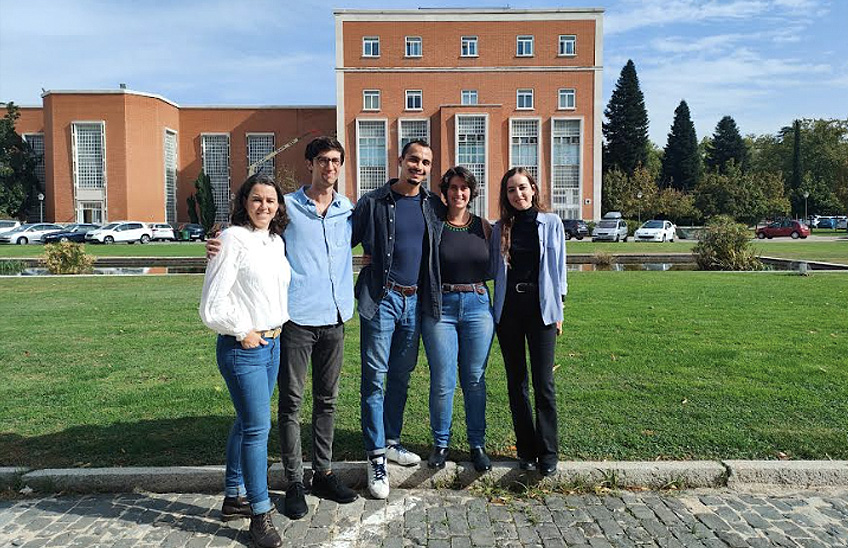A student from Master's Degree of the School, selected to participate in the Climate Summit through the Climate Generation COP27 initiative.
Pablo Sánchez-Bayo, student of the Double Master's Degree University Degree in Architecture + design and management Environmental Building, along with four other students (UPM and UCM) and a professor (UPM), will travel to Egypt in November to be part of the Spanish delegation to COP27.

FotoCedida/Fromleft to right: Professor Julia Urquijo Reguera and students Pablo Sanchez-Bayo, Ismail Sadeq Dfaili, María Sánchez-Bayo and Ana Belén Torrejón.
28 | 10 | 2022
The role of youth is essential in the process of fighting climate change and their involvement is necessary to achieve the Paris Agreements. This is one of the conclusions reached by countries at the last United Nations Climate Change Conferences (Madrid COP25, Glasgow COP26).
In response, the Ministry for Ecological Transition and Demographics challenge (MITECO) launched the initiative Climate Generation COP27 initiative in order to choose the best ideas for projects on resilience and adaptation to climate change, central axes of the next climate summit. With this initiative, MITECO, through the Spanish Climate Change Office(OECC) and the Biodiversity Foundation, and with the partnership of CRUE, has selected the best ideas to be part of the Spanish delegation at COP27, to be held in November in Sharm el-Sheikh (Egypt).
One of these selected ideas is 'Participatory Flood Risk Mapping for Urban Resilience and Risk Reduction in Makeni, Sierra Leone.'. The project has been designed by a team of four students from different academic centers, including Pablo Sanchez-Bayo, student of the Double Master's Degree University Degree in Architecture + design and management Environmental Building(MUA + MDGAE) of the University of Navarra, and a professor.
The jury highlighted the "innovative, participatory, adaptable, scalable and replicable character" of the proposal. In order to increase the resilience and adaptability of Makeni - a paradigmatic example of the African city average - to the phenomena caused by climate change, the project proposes to develop a participatory tool mapping and collection of data floods for subsequent analysis.
This tool, based on citizen science, would collect information on flooding points (damage, vulnerable areas, etc.). It would be the city's inhabitants themselves who would identify and categorize this information. Subsequently, they would participate in the collection and mapping process, in such a way that they would serve as the basis for the analysis of this subject of risks. Thus, these maps could be an element core topic when making decisions on adaptation and increasing the resilience of the city.
The possibility of participating in COP27 gives this team of university students an excellent opportunity to share their project with other young people and professionals committed to the fight against climate change at the highest level. The students began this exciting journey with an idea that has been recognized and awarded. Now, their goal is to continue working, develop it in the form of project and have the opportunity to implement it. This will be a learning journey to address the challenges of climate change adaptation, especially in developing countries development.
Birth of the idea and training of the team
The concrete idea came from field experience and from contact close to the flooding issue, when part of the team had the opportunity to work on the framework of a project of development in the city of Makeni during the summer of 2022. First, they saw that there was a major problem, with the city flooding a couple of times a week during the rainy season, which lasts at least four months of the year. They also observed that there were many cooperation projects where the local population was not fully involved. In addition, they were struck by the great interest in GIS (Geographic Information Systems) and the widespread use of Whatsapp. So, it occurred to them to address this problem through a participatory mapping initiative, tool that they had had the opportunity to study in the Master's Degree in Strategies and Technologies for the development (METD).
The team was put together little by little. The first idea was born from a walk through Makeni, while María Sánchez-Bayo (agricultural engineer) and Ismail Sadeq (International Office and economist), METD students, were in the city. They decided to share the idea with Ana Belén Torrejón (graduate in International Office), colleague of Master's Degree, and Pablo Sánchez-Bayo (student of the Double Master's Degree University Degree in Architecture and in design and management Environmental Building), María's brother. To finish configuring the team, all that was missing was a professor. And so they involved their professor from the School of Agricultural, Food and Biosystems Engineering (ETSIAAB of the Polytechnic University of Madrid) and the METD, Julia Urquijo Reguera, an agricultural engineer with extensive experience in development and an expert in adaptation to climate change and risk management .
Team members
-
Pablo Sánchez-Bayo (University of Navarra). Architect and student of the Double University Master's Degree in Architecture (MUA) and in design and management Environmental Buildings (MDGAE).
-
María Sánchez-Bayo (UPM - UCM). Agricultural engineer and student of Master's Degree in Strategies and Technologies for the development.
-
Ismail Sadeq Dfaili (UPM - UCM). International Office and economist and student of Master's Degree in Strategies and Technologies for the development.
-
Ana Belén Torrejón (UCM - UPM). International Office and student of Master's Degree in Strategies and Technologies for the development.
-
Julia Urquijo Reguera (UPM). Professor of the School of Agricultural, Food and Biosystems Engineering (ETSIAAB) of the UPM, department of Agroforestry Engineering.




